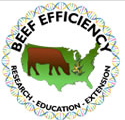Formerly at: www.beefefficiency.org
 Agriculture and Food Research Initiative Competitive Grant no. 2011-68004-30214 from the USDA National Institute of Food and Agriculture
Agriculture and Food Research Initiative Competitive Grant no. 2011-68004-30214 from the USDA National Institute of Food and Agriculture
This USDA-funded project, which ran from 2011 to 2017, aimed to develop selection tools and better understanding of feed efficiency in beef production, identify genetic markers associated with feed intake across multiple breeds and generate data for genomic predictions of feed intake and efficiency. The project collected individual feed intake, weight, and end product quality data from over 8,000 animals across 8 breeds: (Angus, Red Angus, Hereford, Simmental, Charolais, Gelbvieh, Wagyu, Limousin). The project also sought to cooperate with selected seedstock producers and breed association personnel from multiple breeds to help them understand and implement genomic selection, and to gain knowledge relative to the importance of selecting for improved feed efficiency and the tools available to do so.
The research objectives included:
- Gene expression analysis of various tissues in animals with differences in feed efficiency.
- Determine microbial population variation associated differences in feed efficiency.
- Evaluate mitochondrial (cell power houses) differences in animals with differences in feed efficiency.
- Conduct digestibility trials using animals with differences in feed efficiency.
- Evaluate forage vs. concentrate level impacts on observed feed efficiency during different production phases (backgrounding and finishing).
- Determine consistency of DNA marker effects across diets.
- Engage undergraduate students in the research of feed efficiency in beef cattle.
- Develop genomic prediction equations for feed intake and efficiency to be used by breed breed associations.
The long term goals of the project were to reduce the feed resources required to produce beef via the rapid development and deployment of novel nutritional, genomic, and genetic improvement technologies, strengthen the international competitiveness of US agriculture and enable increased food production by diversion of animal to human food or energy crops by increasing production of animal protein without additional feed inputs and the reduction of the greenhouse gas footprint of beef production systems.
Program participants included Drs. Jerry Taylor (Project Director, University of Missouri), Monty Kerley (University of Missouri), Robert Schnabel (University of Missouri), Elisa Marques (GeneSeek, a Neogen Company), Dorian Garrick (Iowa State University), Stephanie Hansen (Iowa State University), Dan Loy (Iowa State University), Robert Weaber (Kansas State University), Chris Seabury (Texas A & M University), Jon Beever (University of Illinois), Dan Shike (University of Illinois),Matt Spangler (University of Nebraska), Kris Johnson (Washington State University), Holly Neibergs (Washington State University), Tad Sonstegard (USDA – Beltsville, MD), Harvey Freetly (USDA – Meat Animal Research Center), John Pollak (USDA – Meat Animal Research Center).
For additional information please contact: Dr. Dan Loy, Professor of Animal Science, Extension Beef Specialist, Director, Iowa Beef Center Iowa State University 313 Kildee Hall Ames, IA 50011 Phone: 515-294-1058 Fax: 515-294-3795 Email: dloy@iastate.edu
